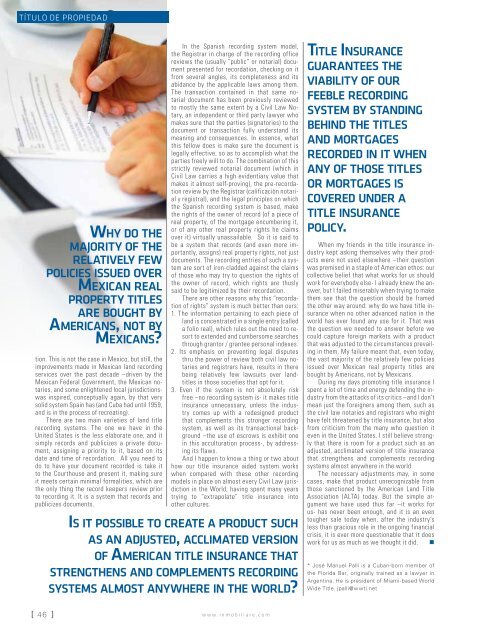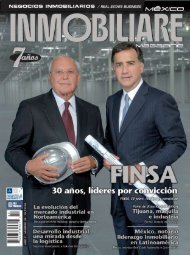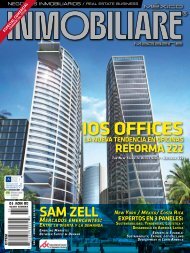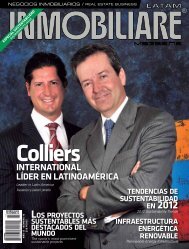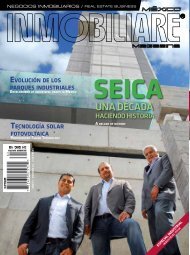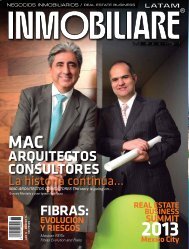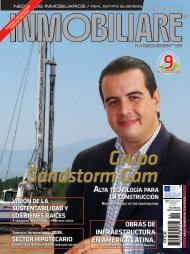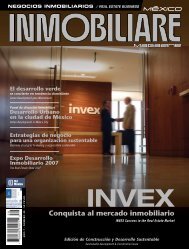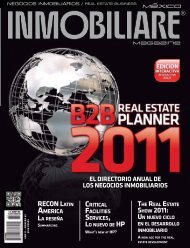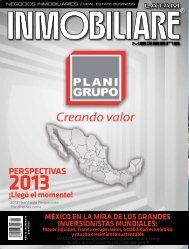INMOBILIARE No. 71
INMOBILIARE No. 71
INMOBILIARE No. 71
- No tags were found...
Create successful ePaper yourself
Turn your PDF publications into a flip-book with our unique Google optimized e-Paper software.
Título de propiedadWhy do themajority of therelatively fewpolicies issued overMexican realproperty titlesare bought byAmericans, not byMexicans?tion. This is not the case in Mexico, but still, theimprovements made in Mexican land recordingservices over the past decade –driven by theMexican Federal Government, the Mexican notaries,and some enlightened local jurisdictionswasinspired, conceptually again, by that verysolid system Spain has (and Cuba had until 1959,and is in the process of recreating).There are two main varieties of land titlerecording systems. The one we have in theUnited States is the less elaborate one, and itsimply records and publicizes a private document,assigning a priority to it, based on itsdate and time of recordation. All you need todo to have your document recorded is take itto the Courthouse and present it, making sureit meets certain minimal formalities, which arethe only thing the record keepers review priorto recording it. It is a system that records andpublicizes documents.In the Spanish recording system model,the Registrar in charge of the recording officereviews the (usually “public” or notarial) documentpresented for recordation, checking on itfrom several angles, its completeness and itsabidance by the applicable laws among them.The transaction contained in that same notarialdocument has been previously reviewedto mostly the same extent by a Civil Law <strong>No</strong>tary,an independent or third party lawyer whomakes sure that the parties (signatories) to thedocument or transaction fully understand itsmeaning and consequences. In essence, whatthis fellow does is make sure the document islegally effective, so as to accomplish what theparties freely will to do. The combination of thisstrictly reviewed notarial document (which inCivil Law carries a high evidentiary value thatmakes it almost self-proving), the pre-recordationreview by the Registrar (calificaciòn notarialy registral), and the legal principles on whichthe Spanish recording system is based, makethe rights of the owner of record (of a piece ofreal property, of the mortgage encumbering it,or of any other real property rights he claimsover it) virtually unassailable. So it is said tobe a system that records (and even more importantly,assigns) real property rights, not justdocuments. The recording entries of such a systemare sort of iron-cladded against the claimsof those who may try to question the rights ofthe owner of record, which rights are thuslysaid to be legitimized by their recordation.There are other reasons why this “recordationof rights” system is much better than ours:1. The information pertaining to each piece ofland is concentrated in a single entry (calleda folio real), which rules out the need to resortto extended and cumbersome searchesthrough grantor / grantee personal indexes.2. Its emphasis on preventing legal disputesthru the power of review both civil law notariesand registrars have, results in therebeing relatively few lawsuits over landtitlesin those societies that opt for it.3. Even if the system is not absolutely riskfree –no recording system is- it makes titleinsurance unnecessary, unless the industrycomes up with a redesigned productthat complements this stronger recordingsystem, as well as its transactional background–the use of escrows is exhibit onein this acculturation process-, by addressingits flaws.And I happen to know a thing or two abouthow our title insurance aided system workswhen compared with these other recordingmodels in place on almost every Civil Law jurisdictionin the World, having spent many yearstrying to “extrapolate” title insurance intoother cultures.Is it possible to create a product suchas an adjusted, acclimated versionof American title insurance thatstrengthens and complements recordingsystems almost anywhere in the world?Title Insuranceguarantees theviability of ourfeeble recordingsystem by standingbehind the titlesand mortgagesrecorded in it whenany of those titlesor mortgages iscovered under atitle insurancepolicy.When my friends in the title insurance industrykept asking themselves why their productswere not used elsewhere –their questionwas premised in a staple of American ethos: ourcollective belief that what works for us shouldwork for everybody else- I already knew the answer,but I failed miserably when trying to makethem see that the question should be framedthe other way around: why do we have title insurancewhen no other advanced nation in theworld has ever found any use for it. That wasthe question we needed to answer before wecould capture foreign markets with a productthat was adjusted to the circumstances prevailingin them. My failure meant that, even today,the vast majority of the relatively few policiesissued over Mexican real property titles arebought by Americans, not by Mexicans.During my days promoting title insurance Ispent a lot of time and energy defending the industryfrom the attacks of its critics –and I don’tmean just the foreigners among them, such asthe civil law notaries and registrars who mighthave felt threatened by title insurance, but alsofrom criticism from the many who question iteven in the United States. I still believe stronglythat there is room for a product such as anadjusted, acclimated version of title insurancethat strengthens and complements recordingsystems almost anywhere in the world.The necessary adjustments may, in somecases, make that product unrecognizable fromthose sanctioned by the American Land TitleAssociation (ALTA) today. But the simple argumentwe have used thus far –it works forus- has never been enough, and it is an eventougher sale today when, after the industry’sless than gracious role in the ongoing financialcrisis, it is ever more questionable that it doeswork for us as much as we thought it did. •* José Manuel Pallí is a Cuban-born member ofthe Florida Bar, originally trained as a lawyer inArgentina. He is president of Miami-based WorldWide Title. jpalli@wwti.net46www.inmobiliare.com


